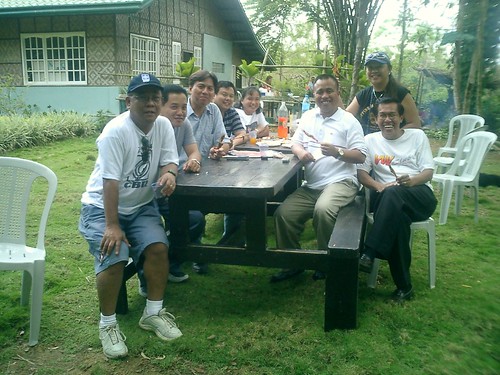The President is the Biggest Threat to Military Discipline

But discipline in the military has deteriorated rather than improved. Although incidents indicating lack of discipline among Filipino troops have been documented throughout history, the extent of the breakdown of discipline that characterizes today's armed forces has no equal. It is systemic, and not just limited to a few recalcitrant individuals.
When I say this, I mean that indiscipline and its manifestations, including graft and corruption, flow from the top down. This becomes inevitable because the AFP is a rigidly centralized, top-down organization. If the leadership itself manifests indiscipline and corruption, then the subordinate echelons will eventually echo such manifestations. Worse, subordinates under these conditions will not only replicate the dysfunctional behavior of their superiors; they will feel less guilty about the whole process.
Ultimately, this process, which legitimizes dysfunctional behavior and materially benefits both superior and subordinate, infects the entire organization or large portions of it.
The magnitude of indiscipline in the military today is mind-boggling. Gross violations of military discipline are committed by no less than the highest-ranking leaders of the AFP. We witnessed this under the leadership of then AFP chief of staff Gen. Fabian Ver under the Marcos regime, but there are now more examples that have been widely reported in the media.
If a unit is led by a professional and honorable officer who is true to his oath, that unit is likely to behave in a manner reflective of the values and character of its leader. If a leader demands blind loyalty, his men will more than likely manifest an uncaring attitude to anything or anyone other than their rigid obedience to the commander's wishes. Since it is the officer corps that sets the tone for the whole organization, it is no wonder that the extent of indiscipline has reached this far.
The victims of the generals' betrayal of core values are the members of the profession who continue to be honorable despite their seniors. In the end, who suffers? The masses whose only guilt is in trusting the leadership of the men and women in uniform to be honorable when in truth they are not.
This brings us to the current political crisis, which challenges the very survival of the concept of discipline following grave accusations that the commander in chief herself violated it along with her sacred oath.
The scandals that question presidential credibility and legitimacy illustrate the gravest form of indiscipline, making the presidency the number one threat to military discipline throughout the armed forces. For how can the AFP continue to obey a leader whose credibility is clearly put in doubt by tapes alleging stolen legitimacy from the last national elections?
Ah, but the tapes are mere allegations and illegally acquired! Notwithstanding that, the AFP is a very sensitive institution where even mere allegations are enough to hasten the loss of allegiance from subordinates. Moreover, soldiers, like many citizens, are able to discern between the more significant nature of the tapes' content than mere technicalities upon which to base their "intelligent and reasoned obedience."
Another illustration hindering leadership-inspired military discipline in the AFP is the President's toleration of the alleged involvement of generals in the 2004 vote-rigging scandal. It is but logical for junior officers to question the President's appointment of the incoming Army chief, Maj. Gen. Hermogenes Esperon Jr., whose name is among those suspiciously implicated by the controversial "Hello Garci" tapes. Former National Security Adviser Roilo Golez sums up the implication of presidential indiscipline in the current crisis when he said that the President "no longer occupies the moral high ground. How can she discipline the military?"
Even before the tapes were leaked, the AFP had been the recipient of repeated presidential indiscipline. There are a number of such instances with varying effects. First, the President's "revolving door" policy in appointing AFP chiefs of staff has only served to heighten the politicization of the military, exacerbating the breakdown of discipline in the AFP ranks.
The wider distribution of political spoils among administration generals may have been meant to extinguish any potential threat coming from the military sector, but this practice eventually weakened the AFP as an institution. It jeopardized long-held traditions of discipline in the military. The President's "revolving door" policy only managed to encourage graft and corruption and the practice of patronage politics at the highest levels of the AFP.
The dysfunctional policy also violates with impunity the fundamental principles of organization and management, and this has made the AFP in a constant state of flux and turbulence.
Second, unwieldy presidential interference in military traditions has exacerbated the deterioration of discipline and morale in the AFP. For instance, presidential interference in awarding the medal for valor to officers whose exploits did not meet the criteria for the award has politicized the giving out of this highest military decoration, thereby dividing the AFP and sowing intrigue in its ranks.
It is therefore the height of hypocrisy to demand discipline from among the ranks of the AFP while the leadership led by the commander in chief follows a different set of military discipline—one that is self-serving.
The author, who used a pseudonym for this essay, is a member of the Armed Forces of the Philippines.







No comments:
Post a Comment